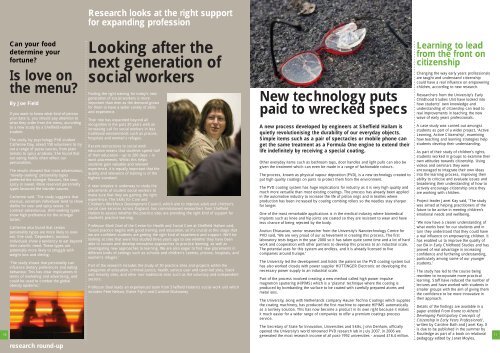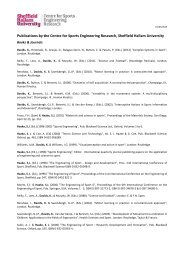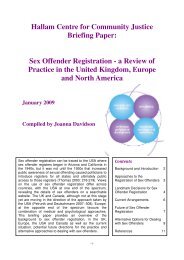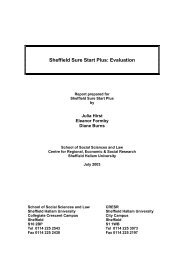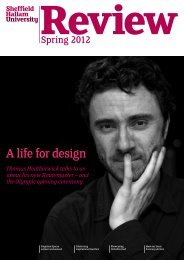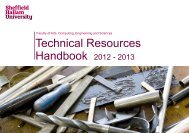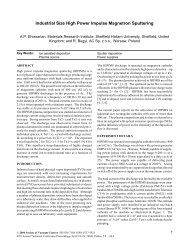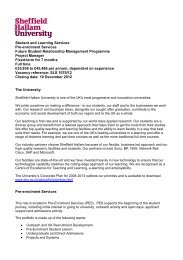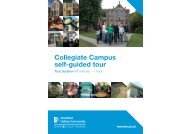Joanne Harris talks novels with newview - Sheffield Hallam University
Joanne Harris talks novels with newview - Sheffield Hallam University
Joanne Harris talks novels with newview - Sheffield Hallam University
You also want an ePaper? Increase the reach of your titles
YUMPU automatically turns print PDFs into web optimized ePapers that Google loves.
10<br />
Can your food<br />
determine your<br />
fortune?<br />
Is love on<br />
the menu?<br />
By Joe Field<br />
If you want to know what kind of person<br />
your date is, you should pay attention to<br />
what they order from the menu, according<br />
to a new study by a <strong>Sheffield</strong> <strong>Hallam</strong><br />
student.<br />
The study, by psychology PhD student<br />
Catherine Day, asked 150 volunteers to try<br />
out a range of pasta sauces, from plain<br />
tomato to spicy arrabiata. She found that<br />
our eating habits often reflect our<br />
personalities.<br />
The results showed that more adventurous,<br />
‘novelty-seeking’ personality types<br />
preferred the stronger flavours, like sour,<br />
spicy or sweet. More reserved personality<br />
types favoured the blander sauces.<br />
Catherine said, ‘The study suggests that<br />
anxious, uncertain individuals tend to show<br />
dislike for sour and spicy tastes. In<br />
contrast adventurous, thrill-seeking types<br />
show high preference for the stronger<br />
tastes.’<br />
Catherine also found that certain<br />
personality types are more likely to overeat.<br />
She said, ‘Dependent, anxious<br />
individuals show a tendency to eat beyond<br />
their calorific need. These types are<br />
potentially more likely to struggle <strong>with</strong><br />
weight loss and dieting.<br />
‘The study shows that personality can<br />
influence dietary preferences and eating<br />
behaviour. This has clear implications in<br />
terms of marketing and advertising, and<br />
could be used to combat the global<br />
obesity epidemic.’<br />
research round-up<br />
Research looks at the right support<br />
for expanding profession<br />
Looking after the<br />
next generation of<br />
social workers<br />
Finding the right training for today’s new<br />
generation of social workers is more<br />
important than ever as the demand grows<br />
for them to have a wider variety of skills<br />
and experience.<br />
Their role has expanded beyond all<br />
recognition in the past 20 years <strong>with</strong> an<br />
increasing call for social workers in less<br />
traditional environments such as prisons,<br />
hospitals and women's refuges.<br />
Recent restructures to social work<br />
education means that students spend half<br />
of their education – up to 200 days – in<br />
work placements. Whilst this helps<br />
students gain valuable and relevant<br />
experience, it is equally important that the<br />
quality and relevance of training is of the<br />
highest standard.<br />
A new initiative is underway to study the<br />
placements of student social workers to<br />
make sure that they are gaining the right<br />
experience. The Skills for Care and<br />
Children’s Workforce Development Council, which aim to improve adult and children’s<br />
social care services across England, has commissioned researchers from <strong>Sheffield</strong><br />
<strong>Hallam</strong> to assess whether the practice sites are providing the right kind of support for<br />
student’s practice learning.<br />
Professor Mark Doel of the Centre for Health and Social Care at <strong>Sheffield</strong> <strong>Hallam</strong> said,<br />
‘Good practice begins <strong>with</strong> good training and education, so it’s crucial at this stage that<br />
we are confident students are getting the right kind of experience and support. We’ll be<br />
looking at sites that were first studied three years ago to see whether they have been<br />
able to sustain and develop innovative approaches to practice learning, as well as<br />
investigating new approaches to learning. We are also eager to find new placements in<br />
different kinds of settings such as schools and children's centres, prisons, hospitals, and<br />
women's refuges.’<br />
Part of the research includes the study of 30 practice sites and projects <strong>with</strong>in the<br />
categories of education, criminal justice, health, service user and carer-led sites, black<br />
and minority sites, and other non-traditional sites such as the voluntary and independent<br />
sectors.<br />
Professor Doel leads an experienced team from <strong>Sheffield</strong> <strong>Hallam</strong>’s social work unit which<br />
includes Pete Nelson, Elaine Flynn and Caroline Mulrooney<br />
New technology puts<br />
paid to wrecked specs<br />
A new process developed by engineers at <strong>Sheffield</strong> <strong>Hallam</strong> is<br />
quietly revolutionising the durability of our everyday objects.<br />
Simple items such as a pair of spectacles or mobile phone can<br />
get the same treatment as a Formula One engine to extend their<br />
life indefinitely by receiving a special coating.<br />
Other everyday items such as bathroom taps, door handles and light pulls can also be<br />
given the treatment which can even be made in a range of fashionable colours.<br />
The process, known as physical vapour deposition (PVD), is a new technology created to<br />
put high quality coatings on parts to protect them from the environment.<br />
The PVD coating system has huge implications for industry as it is very high quality and<br />
much more versatile than most existing coatings. The process has already been applied<br />
in the automotive industry to increase the life of piston rings and in textiles where<br />
production has been increased by coating combing rollers so the needles stay sharper<br />
for longer.<br />
One of the most remarkable applications is in the medical industry where biomedical<br />
implants such as knee and hip joints are coated so they are resistant to wear and have<br />
less chance of being rejected by the body.<br />
Arutiun Ehiasarian, senior researcher from the <strong>University</strong>’s Nanotechnology Centre for<br />
PVD said, ‘We are very proud of our achievement in creating this process. The first<br />
laboratory tests began in the year 2000 so it has taken quite some time and a lot of hard<br />
work and cooperation <strong>with</strong> other partners to develop this process to an industrial scale.<br />
The potential uses for this system are endless, and it is already licensed to five<br />
companies around Europe.’<br />
The <strong>University</strong> led the development and holds the patent on the PVD coating system but<br />
has also worked closely <strong>with</strong> power supplier HÜTTINGER Electronic on developing the<br />
necessary power supply to an industrial scale.<br />
Part of the process involved creating a new method called high power impulse<br />
magnetron sputtering (HIPIMS) which is a ‘plasma’ technique where the coating is<br />
produced by bombarding the surface to be coated <strong>with</strong> carefully prepared atoms and<br />
metal ions.<br />
The <strong>University</strong>, along <strong>with</strong> Netherlands company Hauzer Techno Coatings which supplies<br />
the coating machinery, has produced the first machine to operate HIPIMS automatically<br />
as a turnkey solution. This has now become a product in its own right because it makes<br />
it much easier for a wider range of companies to offer a premium coatings process<br />
service.<br />
The Secretary of State for Innovation, Universities and Skills, John Denham, officially<br />
opened the <strong>University</strong>’s world renowned PVD research lab in July 2007. In 2006 we<br />
generated the most research income of all post-1992 universities - around £18.4 million.<br />
Learning to lead<br />
from the front on<br />
citizenship<br />
Changing the way early years professionals<br />
are taught and understand citizenship<br />
could have a real influence on empowering<br />
children, according to new research.<br />
Researchers from the <strong>University</strong>’s Early<br />
Childhood Studies Unit have looked into<br />
how students’ own knowledge and<br />
understanding of citizenship can lead to<br />
real improvements in teaching the new<br />
wave of early years professionals.<br />
A case study was carried out amongst<br />
students as part of a wider project, ‘Active<br />
Learning, Active Citizenship’, examining<br />
how teaching and learning strategies help<br />
students develop their understanding.<br />
As part of their study of children’s rights,<br />
students worked in groups to examine their<br />
own attitudes towards citizenship. Using<br />
videos and seminars they were<br />
encouraged to integrate their own ideas<br />
into the learning process, improving their<br />
ability to criticise and evaluate issues and<br />
broadening their understanding of how to<br />
actively encourage citizenship once they<br />
are working <strong>with</strong> children.<br />
Project leader Janet Kay said, ‘The study<br />
was aimed at helping practitioners of the<br />
future to be active in meeting children’s<br />
emotional needs and wellbeing.<br />
‘We now have a clearer understanding of<br />
what works best for our students and in<br />
turn they understood that they could have<br />
a real influence on empowering children. It<br />
has enabled us to improve the quality of<br />
our BA in Early Childhood Studies and has<br />
proved of real advantage in increasing<br />
confidence and furthering understanding,<br />
particularly among some of our younger<br />
students.’<br />
The study has led to the course being<br />
rewritten to incorporate more practical<br />
learning. Staff have reduced the number of<br />
lectures and have worked <strong>with</strong> students in<br />
smaller groups <strong>with</strong> the aim of giving them<br />
the confidence to be more innovative in<br />
their approach.<br />
Details of the findings are available in a<br />
paper entitled From Rome to Athens?<br />
Developing Participatory Concepts of<br />
Citizenship in Early Years Professionals’,<br />
written by Caroline Bath and Janet Kay. It<br />
is due to be published in the summer by<br />
Routledge as part of a book on relational<br />
pedagogy edited by Janet Moyles.<br />
11


